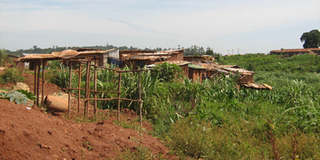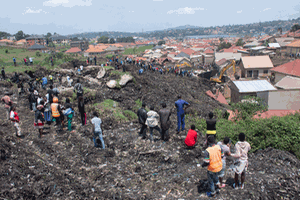Prime
UN sets tough targets for nature conservation

DEGRADATION: One of the wetlands in Kampala that has been encroached on.
What you need to know:
- The UN Secretariat also said ‘‘countries should take radical action to restore wetlands, degraded land and forests.’’
The United Nations (UN) Nature Conservation Secretariat has released a framework with 21 ‘tough’ targets that countries, including Uganda, should hit by 2030- the National Environment Management Authority (Nema) said July 16.
An official document detailing the targets of the UN Convention on Biological Diversity (CBD) highlighted the need to prevent the emergence of future epidemics and pandemics such as Covid-19- with the coronavirus suspected to have jumped from wild animals to people.
There has been a sharp decline in wetland coverage from 15.5 per cent in 1994 to 13 per cent in 2017 and of the remaining wetlands, 4.1 per cent is degraded, according to Nema.
“Ensure that at least 20 per cent of degraded freshwater, marine and terrestrial ecosystems are under restoration, ensuring connectivity among them and focusing on priority ecosystems,” the document from the UN Secretariat reads.
The secretariat also said ‘‘countries should take radical action to restore wetlands, degraded land and forests.’’
Environmental experts at Nema- through the report warn that ‘‘by 2046, if no serious action is taken, all wetlands in the country will be depleted.’’
The government has always been blamed for permitting investors to construct factories in wetlands.
“Each year, Uganda has been losing an average 791 square kilometres of its wetland,” the National State of Environment report released by Nema this year states.
Many farmers are also clearing wetlands to grow rice and other crops as climate change presents the nation with drought.
UN is urging governments to “ensure that all land and sea areas globally are under integrated biodiversity with inclusive spatial planning that addresses land and sea-use change while also retaining wilder areas and other physical existing features intact.”
The UN pointed out the need to address plastic pollution and regulate use of pesticides.
‘‘Counties should aim at reducing nutrients lost to the environment by at least half, and pesticides by at least two thirds, and eliminating the discharge of plastic waste,” UN said.
Other UN targets
•Ensure active management actions to enable the recovery and conservation of species and the genetic diversity of wild and domesticated species.
•Ensure that the harvesting, trade and use of wild species is sustainable, legal, and safe for human health.
•Manage pathways for the introduction of invasive alien species, preventing or reducing their rate of introduction and establishment by at least 50 per cent, and control or eradicate invasive alien species to eliminate or reduce their impacts, focusing on priority species and priority sites.
•Reduce pollution from all sources to levels that are not harmful to biodiversity and ecosystem functions and human health.
•Minimize the impact of climate change on biodiversity
•Ensure all areas under agriculture, aquaculture and forestry are managed sustainably.
•Maintain and enhance nature’s contributions to regulation of air quality and quantity of water, and protection from hazards and extreme events for all people.
•Increase the area of access to and benefits from green and blue spaces for human health and well-being in urban areas and other densely populated areas.




